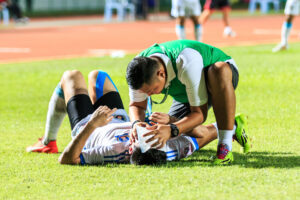Participants in grassroots sports will be better protected from the potentially devastating effects of head injuries following updated guidance published in April by the UK government. Anyone with suspected concussion must be immediately removed from football, rugby and other sports, the NHS 111 help-line should be called and players should not return to competitive sport for at least 21 days in new guidelines issued by the NHS writes David Little, a Partner in our Commercial department who increasingly handles Sports Law cases and Rhian Radia, Partner and Head of our Employment team.
The UK-wide guidelines are aimed at parents, coaches, referees and players.
Its authors say a “culture change” in the way head injuries are dealt with is needed.
“We know that exercise is good for both mental and physical health, so we don’t want to put people off sport,” Prof James Calder, the surgeon who led the work for the government, said.
Quoted here on the BBC’s website he said, “But we need to recognise that if you’ve got a head injury, it must be managed and you need to be protected, so that it doesn’t get worse.”
“If in doubt, sit them out” is the name of the Scottish Government’s guidance, issued in 2018 upon which the UK Government has updated its guidance, here.

The guidance does not yet apply to professional players, for whom the guidance could be very difficult to enforce. For a professional sportsperson the impact of an enforced three week layoff, missing three week’s of matches, the potential perhaps to qualify for a major tournament and along with it thousands of pounds of sponsorship or winnings could be sizeable to player and club.
We’re not aware of any legal challenges from amateur players following the Scottish guidelines, in place since 2018, but now the concussion ban has been extended to the whole of the UK this may change. The professional community may well question how and when it could be expended to cover them.
It’s a complicated issue of course, and as the Guardian reported here earlier in the year Rugby union authorities in England and Wales are facing a major lawsuit as a group of more than 55 former amateur players have begun legal action against the Rugby Football Union, the Welsh Rugby Union and World Rugby, who they accuse of negligence in their failure to protect them from brain injuries during their playing careers.
Whilst amateur players are only playing for glory professionals are not. But should their welfare be an less protected? Already 255 former professional players have joined another joint action, organised by the law firm Rylands Garth, who have submitted Letters of Claim for players diagnosed with a range a neurological impairments, including early-onset dementia, epilepsy, Parkinson’s disease, and motor neurone disease, which they attribute to the effects of the concussive and sub-concussive blows they suffered while playing the sport.
There’s no doubt that the status quo needed to change. Quoted by the Guardian former amateur rugby player Alexander Abbey said: “When you got knocked out, they picked you up and poured a bucket of water on your head, or put a cold sponge down your back, and you woke up, and if you could walk in a straight line you carried on playing, and if you couldn’t walk in a straight line they took you to the sideline until you could.”
In a joint statement, the RFU, WRU and World Rugby have said: “Rugby is a sport that provides many lifelong health and wellbeing benefits for participants at every level. It is loved by millions of current and former players around the globe.
“We care deeply about every member of the rugby family and have been saddened by the brave personal accounts of former players who are struggling with any health issues. We want them know that we care, we listen, and we never stand still when it comes to rugby being the most progressive sport on player welfare.
“Acting on the latest science, evidence and independent expert guidance, we constantly strive to safeguard and support all our players – future, current, and former. Rugby is a leader in the prevention, management and identification of head impacts and we proactively fund transformational research, embrace innovation and explore technology that can make the sport as accessible, inclusive and safe as possible for all participants.”
Has safeguarding players now gone too far? Why can amateur guidelines not be applied to professionals? As we all know, health matters can be quite nuanced and a player seeking a second opinion against their three week ban due to a Head Injury Assessment for example, would be entitled to challenge a 21 day ban. We suspect the case law on these matters which involve issues around Negligence, Sports Law and Employment Law is about to become much more complicated.
Contact our Sports Lawyer
David Little, is a Partner in the Corporate & Commercial team and also Head of Sports Law for the firm. If you would like to contact him please quote Ref CB396 on either 07968 027343 / 020 7631 4141 or email company@bishopandsewell.co.uk.
The above is accurate as at 28 April 2023. The information above may be subject to change during these ever-changing times. The content of this note should not be considered legal advice and each matter should be considered on a case-by-case basis.






